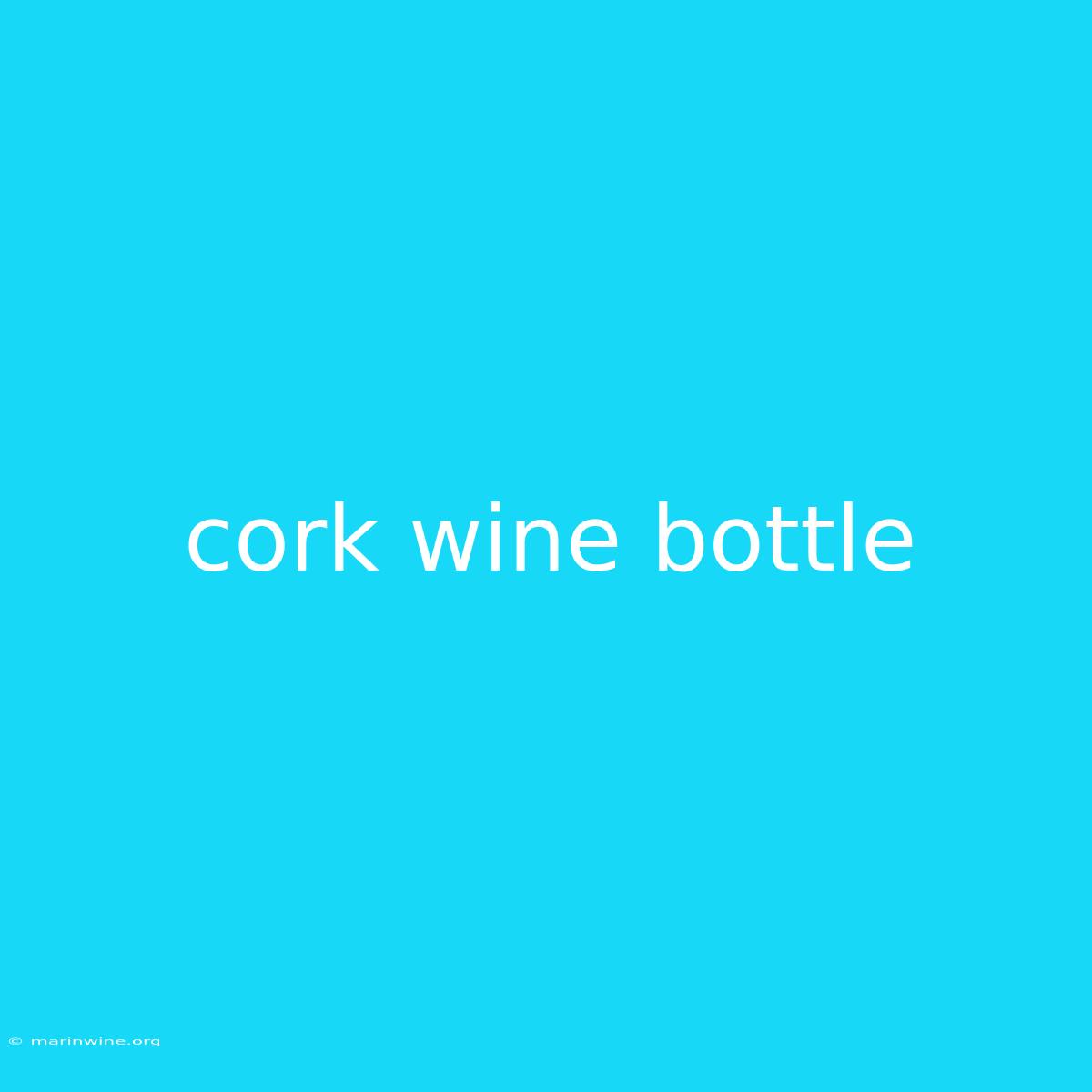Uncorking the Secrets of Cork Wine Bottles: A Journey into Sustainability and Tradition
Editor's Note: Cork wine bottles are making a comeback. While screw caps have gained popularity in recent years, the world of wine is rediscovering the benefits of this natural, sustainable material.
Why It Matters: Choosing a wine bottled with cork isn't just a matter of taste; it's a statement about your values. Cork is a natural, renewable resource, offering a sustainable alternative to plastic or metal closures. This article delves into the world of cork wine bottles, exploring its history, benefits, and why it's gaining momentum once again.
Key Takeaways of Cork Wine Bottles:
| Benefit | Explanation |
|---|---|
| Sustainability | Cork is a natural and renewable resource, harvested from the bark of cork oak trees without harming the tree. |
| Flavor Preservation | Cork's unique porous structure allows for a slow and controlled exchange of oxygen, ensuring the wine ages gracefully. |
| Tradition | Cork wine bottles have been a hallmark of quality winemaking for centuries, representing heritage and craftsmanship. |
| Environmental Friendliness | Cork is biodegradable and compostable, minimizing its impact on the environment. |
Cork Wine Bottles: A Deeper Dive
The History of Cork Wine Bottles
Cork has been used for centuries as a natural sealant for wine bottles, dating back to ancient Egypt and Rome. This practice solidified in the 17th century in Portugal, a region known for its abundant cork oak forests. The use of cork continued to flourish, becoming a symbol of quality and tradition in the winemaking world.
The Benefits of Cork Wine Bottles
Sustainability: Cork is a renewable resource, harvested every 9-12 years without harming the cork oak tree. This sustainable practice helps protect biodiversity and ecosystems.
Flavor Preservation: The unique porous structure of cork allows for a controlled exchange of oxygen, which is essential for the aging process of wine. It allows the wine to breathe while preventing oxidation, resulting in a more complex and nuanced flavor profile.
Tradition: Cork wine bottles hold a rich history and tradition, embodying the craftsmanship and heritage of winemaking. Many wine enthusiasts consider cork to be an integral part of the sensory experience, adding to the overall enjoyment of the wine.
The Challenges of Cork Wine Bottles
TCA Contamination: One challenge with cork is the risk of TCA (trichloroanisole) contamination, which can impart an off-flavor known as "cork taint." This issue has prompted some winemakers to explore alternative closures like screw caps. However, advancements in cork production and quality control have significantly reduced the incidence of TCA contamination.
Consistency: While cork provides a natural and traditional closure, some argue that its variability can affect the consistency of the wine's aging process. This has led to the adoption of screw caps in certain regions and for specific wines.
The Future of Cork Wine Bottles
Despite the challenges, the future of cork wine bottles remains bright. The wine industry is increasingly prioritizing sustainability, and cork offers a natural and renewable alternative to other closures. Furthermore, advancements in cork production are addressing the concerns of TCA contamination and consistency. As the wine industry continues to evolve, cork wine bottles are poised to reclaim their place as the premier choice for quality and sustainability.
FAQ for Cork Wine Bottles
Q: Are cork wine bottles better than screw caps?
A: The choice between cork and screw caps is subjective and depends on personal preference and wine style. Cork offers a traditional and sustainable option with a potential for a more complex flavor profile, while screw caps provide consistency and reduced risk of TCA contamination.
Q: How can I tell if a wine bottle has a cork taint?
A: A wine with cork taint will typically have a musty or moldy odor. If you smell anything unusual, it's best to avoid the wine.
Q: Are cork wine bottles more expensive than screw caps?
A: The cost of cork wine bottles can vary depending on the quality and type of cork used. However, in many cases, cork closures are comparable to screw caps in terms of price.
Q: How do I open a cork wine bottle?
A: Use a proper corkscrew to open a cork wine bottle. Avoid twisting the bottle or using excessive force, as this can damage the cork.
Tips for Enjoying Cork Wine Bottles
- Store your cork wine bottles horizontally. This keeps the cork moist and prevents it from drying out.
- Use a proper corkscrew. A good corkscrew will help you extract the cork cleanly and without damaging it.
- Decant your wine. Allowing your wine to breathe in a decanter can enhance its aroma and flavor.
- Enjoy the experience! Cork wine bottles offer a unique and traditional sensory experience that complements the enjoyment of fine wine.
Summary of Cork Wine Bottles
Cork wine bottles offer a sustainable, traditional, and flavor-preserving option for wine lovers. While challenges exist with TCA contamination and consistency, advancements in production are addressing these concerns. As the wine industry embraces sustainability, cork is poised to reclaim its rightful place as the premier closure for quality wines.
Closing Message: Next time you choose a bottle of wine, take a moment to appreciate the cork. It represents a commitment to sustainability, tradition, and a natural approach to winemaking. By supporting cork wine bottles, you're contributing to a more sustainable future for wine and the environment.

